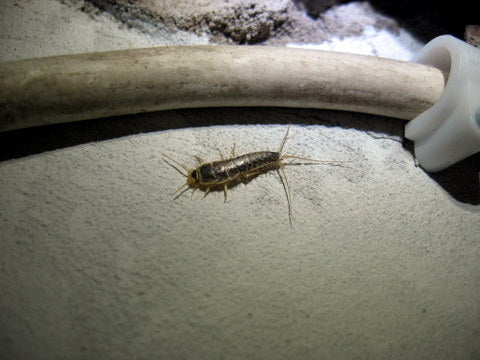
It's bug time here at Pedchem, and we're ready to count all the bugs that invade common areas in your home. Don't worry though. Just because these bugs could be found in your house doesn't mean you'll find any. However, if you're ready to combat an impending infestation, here's the most common places to find bugs in your home.
Common Attic Bugs and Insects

More than a half dozen varieties of pests call the attic their home. In most cases, they scratch and scurry about, making their presence obvious. Other times, they come and go as they please without your being aware of their activities. Some of these pesky invaders include: Roof rats, House mice, Bats, Cluster flies, Raccoons and Squirrels.
Roof Rats in the Attic
Roof rats, as their name indicates, prefer to live under the shade of your roof - in the attic. They are excellent climbers and use nearby trees to gain access to your building. They can squeeze through holes the size of a quarter and gain entry into your house through pipes, drywall, aluminum siding and other openings.
House Mice in the Attic
House mice prefer to live in the dark, usually in a secluded corner of the attic. Packing supplies, insulation, leftover construction materials, boxes and anything stored in the attic are their favorite spots to hide and breed. Additionally, accessing the attic is no big deal for these mice as they are known to be excellent climbers just like roof rats and are able to scale branches, shrubs and trellis without a hitch.
Bats in the Attic
Bats are not uncommon in home attics that are accessible through openings as tiny as half an inch battery. Big brown bats find their way into an unprotected attic to roost and make it their personal cave. They can squeeze through holes, crawl into structures and fly to find the perfect spot to hide and live. They prefer to be cooped up in one place and might cause a huge problem if for some reason their population exploded.
Cluster Flies in the Attic
Cluster flies form compact clusters in attics and wall voids. They can become a nuisance during the winter, spring and autumn - the times of the year when they typically hibernate, as well as in spring - when they leave the attic to return again.
Raccoons in the Attic
Raccoons are cool and harmless when they are in the wild, but once they gain access to your attic, they can wreak havoc. Homes surrounded with open trash cans are much more vulnerable to their undertakings. Foraging for garbage, they will sneak through eave gaps and screened vents and head straight to your attic to 'settle down'.
Squirrels in the Attic
While you are appreciating the tree squirrels on the tree, they can find their way into your attic if need be, and when you aren't looking. Although most of their summer activities are confined to the nearby trees, they hunt for structures with attics when the temperature drops. Without proper insulation, tree squirrels can easily invade your house and lead you into making costly repairs.
Common Bedroom Bugs and Insects

Bedrooms are also vulnerable to harmful pests and insects. Of course, there may be conditions and occasions in these rooms that make it favorable for these pests to invade. Extremes of weather, infestation in other areas of the house or visits from household pets will occur occasionally. Even the level of humidity in the bedroom may trigger pest infestation no matter how clean the room is. Some of these pesky invaders include: Fleas, Bed bugs, Spiders, Ants, Roaches and Silverfish.
Fleas in the Bedroom
Fleas feed on warm-blooded animals and can easily make their way into bedrooms via household pets. Typically, fleas lay their eggs on pets, such as cats and dogs. These eggs hatch into adult fleas, migrating from one pet to another, and eventually, humans.
Bed Bugs in the Bedroom
Bed bugs feed on human blood when they are asleep; it's a common bedroom pest found virtually anywhere people congregate - in homes, hotels, schools, malls, hospitals and apartments. They are known as excellent hitchhikers, traveling from one place to another through mattresses, dirty laundry, travel bags and books. Once they reach their destination, they immediately go into hiding in dark places, like under the mattress, and wait for complete darkness to latch onto exposed skin.
Spiders in the Bedroom
Although found outdoors and in garage areas, spiders can be anywhere, even in your bedrooms. There are literally dozens of different kinds of spiders, and some of them maybe familiar to you, although perhaps not in their ability to become a major nuisance. Others may be unfamiliar because they are so tiny you have thought them to be ants.
Other Pests in the Bedroom
Although less common, roaches, ants, silver fish and other insects may also invade your bedroom, especially if there is food crumbs on the floor or the room is cluttered.
Common Bathroom Bugs and Insects

If cleanliness is the signature of your bathroom, a well-cleaned one has tremendous potential to prevent the invasion of all types of bugs and insects. However, even a spotless bathroom suffers when the condition is not so ideal - such as the presence of moisture, water leaks, faulty plumbing line and other issues. Some of these pesky invaders include: Ants, Roaches, Silverfish, Clogmia, Spiders and Centipedes.
Ants in the Bathroom
Carpenter ants and pharaoh are some of the most common ant species that are known to invade washrooms and restrooms. Clogged drains and water damage provide an ideal environment for these ants to live and thrive. They usually seek refuge behind baseboards, under floors and wall voids.
Roaches in the Bathroom
Roaches prefer warm and moist environment, which is why they have an affinity for sewers and drains, and no room in a house is more close to drains than bathrooms. If drains are clogged or pipes aren't clean, invasion from roaches can become hard to avoid.
Other Pests in the Bathroom
Other pests, such as silverfish and clogmia, can find their way into your bathroom through floorboards and dry-walls. Feeding on mold, they prefer to live in moist, humid habitats like pipes and drains. Spiders and centipedes are also commonly found in bathrooms hunting for smaller insects, bugs and other pests for food.
Common Kitchen Bugs and Insects

If you have taken a minute to scan your kitchen, you may notice that you and your family are not the only ones gathering for breakfasts and dinners day in and day out. There may be ants, rodents, house flies, fruit flies roaches or pantry pests using the room, too. Fortunately, most of them disappear when their food sources are out of their sight. Some of these pesky invaders include: Ants, Rodents, Roaches, Pantry pests and Flies.
Ants in the Kitchen
House ants, such as pavement ants and Argentine ants, are commonly found in kitchen areas or where food is in open containers. They are usually found marching one-by-one on the floor, counter-tops or baseboards. They all have ambitious appetites and are attracted to moisture area, both of which are found in kitchens. These ants love sweets, and feed on bread, oils, meats, fats and anything edible they come across.
Rodents in the Kitchen
Rodents are regular kitchen invaders in commercial establishments and are known to catch the attention of health inspectors. Some signs of rodent infestation include droppings on the floor, in cabinets, under the sink and near food containers, holes chewed in food packages, walls and netting.
Roaches in the Kitchen
Cockroaches infest household kitchens faster than any other pests. They hide so well that they are difficult to spot at first. They are notorious to cause health code violation in commercial kitchens as well. Roaches will take up any place in the kitchen - cabinet corners, floor corners, inside containers, behind refrigerators and ovens.
Pantry Pests in the Kitchen
Pantry pests, such as merchant beetles and Indian moth and found in grains and lentils, may have originated from the store or merchant you bought the product from. The grain bag when opened allows these pests to slowly shift their base to cabinets, floors and other areas of the kitchen. Although harmless and non-toxic, they can become a nuisance if left unchecked.
Flies in the Kitchen
Fruit flies and house flies are the two most common flying objects found in the kitchen. While house flies feed on all types of food, fruit flies are attracted to sweet and citrus fruits only. Leaving ripe fruits and vegetables is sure to attract flies into your kitchen and invite them to dine with you.
Common Living Room Bugs and Insects

Probably because your living room has been hosting a number of activities for friends and family, there is a possibility that it has been inadvertently playing host to a wide variety of bugs, pests and insects. There are plenty of opportunities, therefore, for these insects to gain entry, and plenty of reasons for them to stay. Some of these pesky invaders include: House flies, Ants, Bed bugs, Stink Bugs, Ladybugs and Carpet Beetles.
Flies and Ants in the Living Room
Ants and flies are likely to come from a variety of places into your living room, such as outdoors, kitchen and stairs. They feed on leftovers that you accidentally forgot to clean up after a late-night movie. While Argentine and pavement ants eat prefer sweets and salty edibles, house flies are less picky and will feed on anything and everything lying in plain sight.
Bed Bugs in the Living Room
Bed bugs not just invade beds, but living room furniture too. How they get into your living room is not different than how they enter your bedroom. They hitchhike, catch a ride through clothing, travel bags, mattress and other things from places like hotels, schools and malls.
Other Pests in the Living Room
Carpet beetles, stink bugs and ladybugs are some of the insects that make their way into a living room from outside. Ladybugs and stink bugs typically stop at the windows and doors, while carpet bugs venture further into other rooms to feed on dead insects and fabrics.
Common Basement Bugs and Insects
Whether it's a face-lifted spare room or a full-scale remodeled storage room, turning your basement into a bug-free and insect-free zone is a Herculean task as every basement is susceptible to some kind of pest infestation at some point. Most basements are less airy and bright, which is what pests prefer - dark, damp and closed enclosure. A wide variety of bugs thrive in such areas, and these bugs include termites, roaches and spiders. Some of these pesky invaders include: Roaches, Termites, Centipedes, Spiders, Camel Crickets, Rodents, Pillbugs, Earwigs, Snowbugs, Millipedes.
Roaches in the Basement
Roaches prefer to dwell in sewers and drains but may opt for a basement if they find it cozy and attractive. They enter basements that has moisture build up and poor sanitation through door thresholds, underground drains and utility pipes.
Termites in the Basement
Termites live in underground colonies but can easily make a basement their home if the room is dark and damp. They feast on structural wood and enter through crevices and cracks present in beams and joists.
Centipedes in the Basement
Centipedes prey on crickets, flies and spiders which are usually found in basements and dark corners.
Spiders in the Basement
Spiders, such as cellar and black widow, like to spin their webs in moist and dark areas of a building, like a cluttered basement.
Camel Crickets in the Basement
Crickets with humpback appearance called camel crickets invade basements for living and hiding when the weather gets too hot or dry. They are nocturnal, which makes basement a perfect spot for finding food and living.
Rodents in the Basement
Droppings, gnaw marks, rub marks and damaged items in the basement are all signs that it is infested with rodents.
Other Pests in the Basement
Snowbugs, earwigs, pillbugs and millipedes are some of the other bug species that infest basements due to change in outdoor climate conditions.
Common Backyard Bugs and Insects

It is a rare backyard that does not have bugs and insects as well as pest problems now and then. Butterflies, ladybugs and ants are a few of the varieties to adore. Other insects, however, are more than just an eye-catcher; they sting and make your skin crawl, even if they do not cause obvious trouble for the yard. Some of these pesky invaders include: Ticks, Mosquitoes, Stinging Insects, Scorpions, Ants and Fleas.
Ticks and Mosquitoes in the Backyard
Mosquitoes and ticks are capable of spreading diseases, such as Lyme disease and West Nile Virus, which means they cannot be ignored. In some regions, especially where houses are closer to wooded areas, they may plague the yard making it absolutely impossible to enjoy the beauty of your backyard.
Stinging Insects in the Backyard
Wasps, hornets and Yellow jackets are a few varieties of stinging insects that you don't want to have in your backyard for any reason. They not only create a hostile environment in your yard but can wreak havoc on your lifestyle as well. Stings of wasps and hornets may require medical attention, especially for those who are allergic to it.
Scorpions in the Backyard
Those who live in the southwest part of the country don't have to worry about ticks or wasps in their backyards but scorpions. Scorpions dig burrows when the weather is cold and enter homes when it's hot. They sting as a defense mechanism but that single sting could turn fatal, which is why paying attention to its presence in your backyard is crucial.
Ants in the Backyard
There are more than 700 species of ants in the US, so it shouldn't come as a surprise if you find more than two or three varieties in your property. They typically live in colonies underground and make areas around plants and pathways their marching ground. Fire ants sting can be painful just as the stings from oak ants and harvester ants.
Fleas in the Backyard
Fleas are attracted to people and pets and get rides from rodents and wild animals they come across. They make your backyard a breeding ground, with female fleas producing up to 500 offspring during the mere 100 days of their lives.
Common Garage Bugs and Insects

No other rooms in your house gives easy access to bugs and insects than your garage. While a garage is meant to store vehicles, tools, equipment and gears, rodents and pests seeking protection from outdoor heat, rain or snow can quickly enter into it and shelter themselves. Some of these pesky invaders include: Crickets, Silverfish, Spiders, Mice, House Flies and Ground beetles.
Crickets in the Garage
Camel crickets may be harmless to humans but their invasion in the garage may ruin your belongings, such as clothes, soft toys and other fabrics.
Silverfish in the Garage
Silverfish are known to find favorite spots for hiding in the garage. They are particularly fond of this part of the house because, they rarely get attention. These insects gain easy entry into the garage through doors, windows and floor ventilation, or from things brought from outside, such as infested cardboard boxes and furniture. Once inside, they feed on glue, clothing and paper.
Spiders in the Garage
There is no better place to call home than garages for spiders, because this is where they can find plenty of insects, bugs and pests to feed on. Plus, garage is usually the last place in the house that gets cleaned, so spiders prefer to live there for a considerable amount of time.
Mice in the Garage
Deer mice are known to seek shelter in garages during cold seasons. These invaders will build nest in boxes and other hiding places. They may sneak into other rooms of the house and into cars, chewing anything they come across along the way.
House Flies in the Garage
House flies and other types of flies are attracted to odors and air currents. Garage, when it becomes a catch-all for household items, it shouldn't come as a surprise for homeowners when house flies invade this space. House flies tend to rest on nearly anything in the garage, such as floor, walls, window sills and things lying around.
Ground Beetles in the Garage
Ground beetles are outdoor nocturnal species but may make their way into your garage through poorly sealed doors and openings. Once inside, they hide behind boxes, inside empty containers and dark corners during the day and stay active at night.
There you have it. That's a lot of bugs. And that's also a lot of places you can find insects in your home. Don't worry though. Pedchem has a variety of insecticides to kill bugs at home and to keep infestations from bothering you no matter the time of year or whether it's in your bathroom, bedroom, garage or any other part of your house.






Leave a comment (all fields required)